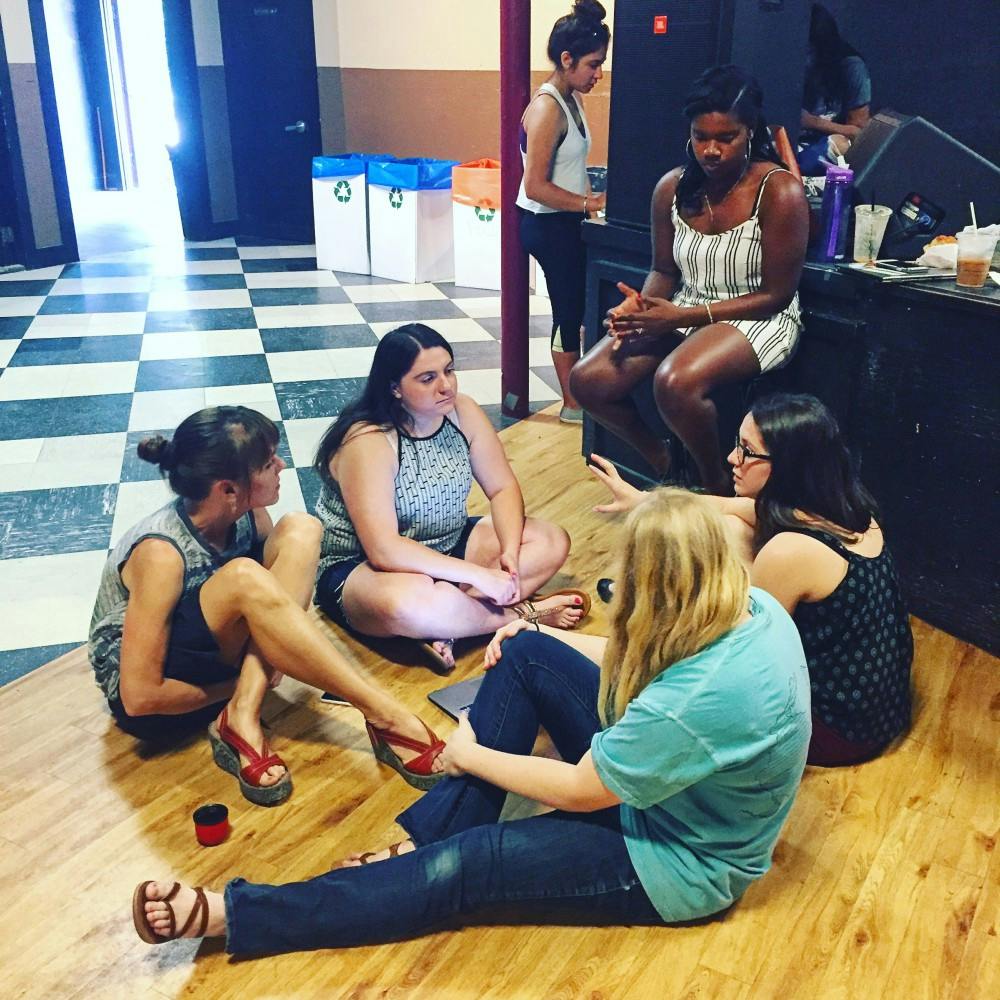The students in the FRE378: “Cultural Shifts in France Through Music” course have been busy at work this semester studying the May 1968 revolution in France and its modern day relevance. But the class hasn’t spent much time behind desks.
Instead, they’ve been busy writing, rehearsing and producing a full length performance to open 7:30 p.m. May 5 at the College Street Taphouse. The event is free to attend, but the class will collect donations of school supplies at the door for Alamance-Burlington public schools. The performance will be a combination of covering songs from the 1968 time period and original poems, skits, narrations, songs and even a rap.
“It’s a live performance, yes. But it’s also sort of like an interactive art installation,” said Sarah Glasco, associate professor of French, who teaches the course. “There will be posters featured that students made as in class academic assignments, banners, ‘mugshots’ of each student posing as a protestor, a slideshow with images from May 1968 protests and the entire show translated into English with subtitles projected throughout the performance.”
The first half of the semester was spent studying the events around the 1968 revolution, specifically analyzing France’s role in the world at that time and the social and artistic environment of the country. Since returning from Spring Break, the class has shifted to putting the performance together.
Each student in the class will be performing in the show or is on the production or public relations side. Some students, including junior Nicole Ackman, have decided to double-dip. Ackman is in charge of operating the Facebook event for the performance, entitled “Liberte! Egalite! Sexualite!: Revolution a Paris, mai 1968” as part of the public relations team. She also assists in creating flyers.
In addition to public relations, Ackman will be performing two skits and reading a poem she authored.
“It’s a really neat opportunity to get to learn about something and be involved in it and show it off,” Ackman said. “It’s easier for it to feel relevant.”
The class is collaborating with Lecturer in Music Clay Stevenson’s “Live Sound Production and Recording” class, who is running sound for the show and recording the entire performance. At the end of the semester, there will be a documentary showing the entire performance, as well as behind-the-scenes footage of the rehearsals.
Even though the performance is centered on the events that happened in May 1968, both Ackman and Glasco feel audiences will be able to connect with pieces addressing workers’ rights and feminism.
“I want the students and the public — whoever shows up — to really understand that France was an uptight place before 1968, mainly because of so much political instability over [the previous] 180 years,” Glasco said. “Workers in France were more like Americans, meaning that they were working 60 hours a week, no overtime, could not support their families.”
“And students were totally stifled by professors with God complexes who just lectured all day long and gave no room for critical thinking and creativity. The State was trying to educate a bunch of technocrats, and the college students of the day stood up to that and said, ‘I am not a robot.’”
The show also touches upon more recent issues in France.
“Universal healthcare in France? Also a fairly recent thing,” Glasco said. “Students constantly protesting? They do so with ease now because of the ’68ers. And the whole sexual liberation? Girls and guys were not even allowed to be in each other’s dorms pre-’68 and they had no rights because you had to be 21 to vote at the time.”
The main goal of the performance is education — both for the students in refining their language and comprehension skills and for audiences to challenge any preconceived notions about France and French culture.
“Most people out there don’t know [about 1968 and the struggles],” Glasco said. “They just think France has always been this haven for sex and liberalism and mistresses and ‘laziness.’ The France we know today exists in large part because of the will of the youth — and the mentors who supported them — of that era. Politics didn’t change much at all, and there really wasn’t a true ‘revolution’ in the end in that arena, but it was certainly the catalyst for great social reforms and socio-cultural shifts.”
After the performance, there will be a faculty-led discussion and reception with Professor L.D. Russel, lecturer of the Religious Studies department and Kirstin Ringelberg, associate professor of Art History for those interested in learning more.


